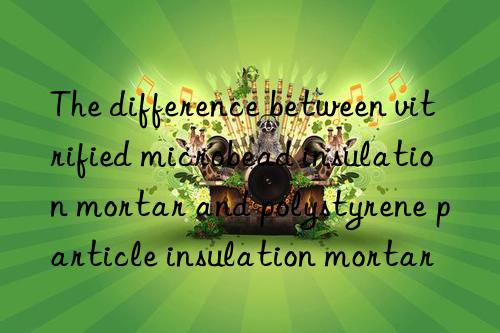
The most obvious difference between vitrified microsphere thermal insulation mortar and polystyrene particle thermal insulation mortar is that one is made of inorganic fire-resistant vitrified microspheres, and the other is organic flammable polystyrene particles. Vitrified microbead insulation mortar is Class A fireproof, green and environmentally friendly, and has the same lifespan as the building; polystyrene particle insulation mortar is not fireproof and not environmentally friendly. The polystyrene particles themselves are prone to aging and have a short lifespan.
Features of vitrified microbead thermal insulation mortar:
Vitrified microbead thermal insulation mortar is divided into inorganic vitrified microbead thermal insulation mortar and expanded vitrified microbead thermal insulation mortar. Expanded vitrified microbead thermal insulation mortar Microbead thermal insulation mortar was used earlier. Its main components are rosin rock and gelling agent that have been expanded at high temperatures. Expanded vitrified microbead thermal insulation mortar is an open-cell thermal insulation material. Its advantage is low bulk density, suitable for high-rise use, and thermal conductivity <0.07. Its disadvantage is poor impermeability. The main components of inorganic vitrified microsphere thermal insulation mortar are perlite and gelling agent. It is a closed-cell material. Its advantage is that it is easy to construct. However, due to its high bulk density, it is not suitable for use in high-rise buildings, and it is not suitable for use in buildings with exterior wall tiles. The area should be reinforced with steel mesh. Thermal conductivity <0.078. The inorganic thermal insulation mortar we often refer to refers to polystyrene particle mortar, whose main components are polystyrene particles and gelling agent. In fact, polystyrene is not an inorganic material, but an organic material, so its combustion level does not meet the national requirement of Class A. Inorganic vitrified microbead thermal insulation mortar and expanded vitrified microbead thermal insulation mortar are both types of inorganic thermal insulation mortar. Vitrified microbead thermal insulation mortar is divided into JZ-C type, JA type, and JL type due to different additional materials.
Vitrified microbead mortar:
It is a single-component dry powder thermal insulation slurry produced using expanded vitrified microbead material. It has excellent thermal insulation performance and fireproof and chemical resistance. , no hollowing, no cracking, high strength, good construction performance, can be directly constructed on dry walls. This product makes up for the many defects and shortcomings of traditional ordinary expanded perlite lightweight aggregate thermal insulation mortar in terms of materials. At the same time, it also makes up for the flammability of organic materials such as polystyrene particles, the generation of harmful gases at high temperatures, aging resistance, and low weather resistance. As well as shortcomings such as poor workability and high elasticity during construction, the comprehensive performance and construction performance of dry powder insulation mortar have been greatly improved.
Product features:
1. This product is a single-component dry powder material with light bulk density and good thermal insulation performance.
2. High strength, strong adhesion, good adhesion, no hollowing and cracking, and smooth scratching.
3. It has excellent fire resistance and weather resistance.
4. The main raw materials of this product are all inorganic materials, which are environmentally friendly and harmless, cost-effective and have good overall performance.
Scope of application: Suitable for internal insulation of external walls of poured concrete, porous bricks, hollow blocks, aerated concrete blocks, ceramsite concrete products and other walls. Polystyrene particle insulation mortar is a B2 class combustible material and has been banned by the state. Vitrified microbead thermal insulation mortar belongs to Class A non-vitrified microbead thermal insulation mortar. Compared with polystyrene particles, it has high strength, light weight, thermal insulation, good heat insulation, good electrical insulation properties, wear resistance, corrosion resistance, radiation protection, etc. Distinctive features. </p



 微信扫一扫打赏
微信扫一扫打赏
